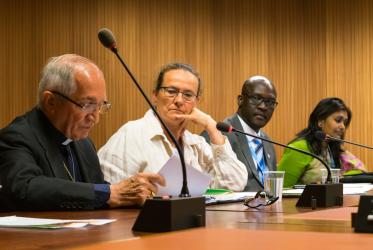Displaying 41 - 60 of 71
GEM school ends with hope for a better tomorrow
08 September 2016
L’École GEM s’achève sur l’espérance d’un avenir meilleur
08 September 2016
A just financial and economic architecture is possible, students find
08 September 2016
Consultation considers right to food in context of climate change
15 December 2015
Interfaith workshop calls for justice and compassion in finance
03 December 2015
Climate pilgrimage toward COP21 pauses in Geneva
05 November 2015
Weaving together personal faith and climate change
23 September 2014
Prayers, reflections and action during “Time for Creation”
15 September 2014






